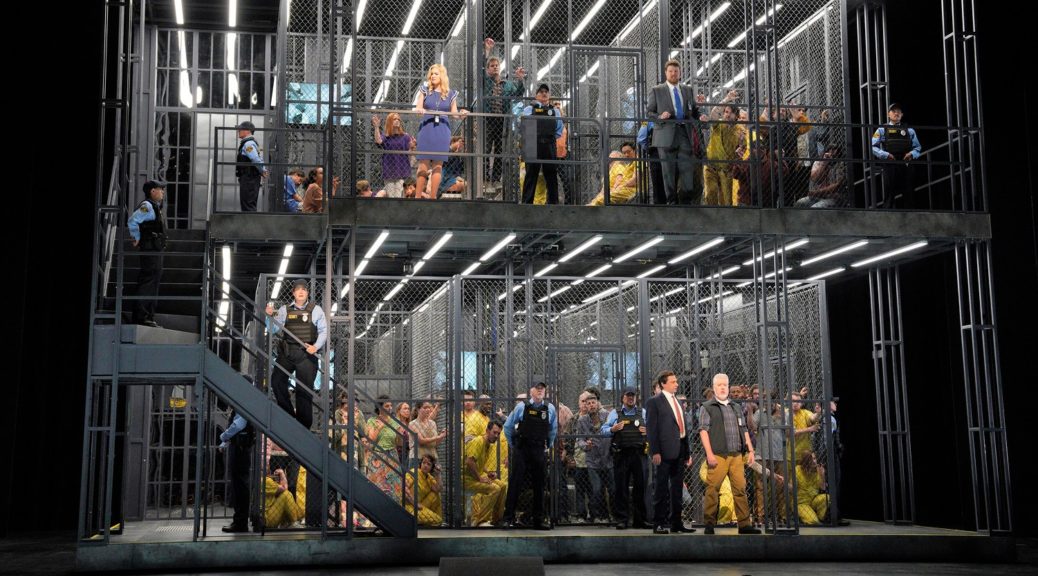
BEETHOVEN OPERA, HELD UP
They did right by Beethoven at the S.F. Opera, staging his only (and foresightedly heroic) opera “Fidelio” nearly a year after his 250st birthday, with Covid19 acting as the black-hat hold-up man at the War Memorial Opera House.
If the performance was a bit spotty, no matter—the key word was revolutionary, his message of freedom and individuals bucking repression and suppression by corrupt authorities. And how revolutionary it was in 1805 to have a woman disguising herself as a man and prison guard to do the heroic deed freeing the political prisoner Florestan, opera’s first great freedom fighter, at great personal risk. Their also being married leads to expressions of love and a grand public celebration in the finale’s music foreshadowing the epic “Ode to Joy” still locked up for years in the mind and quill of the ill-fated composer Ludwig van Beethoven, who became stone deaf early on and left us at age 55. Given all the political prisoners around the world in today’s news, this opera is more than relevant.
The opera showed the composer in transition, starting off with a traditional, low-key German Singspiel work (related to the mode of Mozart’s “Magic Flute”) and erupting in huge vocal outpourings and high drama of the future, with its passion bleeding into the rich score. It’s as if the last act were written some decades after the first.
If you were expecting huge Wagnerian voices again in the two leads the other night, recall that when this opera appeared, Wagnerian voices were not yet cultivated and Richard Wagner himself not yet born. Slow starting, soprano Elza van den Heever was effective and vibrantly hall-filling in the final scenes as Leonore, the opera’s main character (called Fidelio in her male guard’s disguise).
The low male voices were admirable, from Greer Grimsley’s Pizarro to Soloman Howard’s Fernando to James Creswell’s Rocco. The best German of the night in the spoken passages came from Grimsley and Creswell. The supertitle translations softened the text, changing Rocco’s “Gold” aria dripping with greed to a mild discourse on the important of money in this world. Tenor Russell Thomas’ Florestan fared best in the ensembles. He was hampered by his confinement, in a lower-depths dungeon, seated in a golden chair worthy for a monarch. Tilt!
Overall, conductor Eun Sun Kim’s best moments came in leading the various trios and quartets by the principals as well as in holding together the massed crowds of the finale. Notable was how her orchestra brought out the surge within Pizarro’s arietta (act two, scene one), where similarities had you swearing that Beethoven was extremely familiar with the hell-scene finale of Mozart’s “Don Giovanni.”
Kim’s keeping the orchestra and singers in sync worked intermittently. More control over the brass section, and a bit more rehearsal, would have been welcome.
If you like contemporary production with modern structures, TVs and cell phones, this is your show, with the two-story rotating set by Alexander V. Nichols clearly the big attention-getter. Some corners had been cut, out of pandemic necessity, where the warehouse-like structure hardly suggested a dungeon nor the depths for digging Florestan’s intended grave. Also cut in part was some of the dated dialogue, but uncut was the curiously bifurcated Beethoven score, a unique gem handed down, as “Fidelio” was his only such venture.
Opera fans were already regretting the impending 2022 retirement of Choral Director Ian Robertson, who shaped the awe-inspired (Male) Prisoners Chorus in act one and the augmented mixed chorus of the finale.
Stage Director was Matthew Ozawa.
MUSIC NOTES—Audiences were still euphoric about the resumption of an indoor opera season, after “Tosca” and “Fidelio,” both assembled under rather arduous conditions of pandemic which, among other things, inhibited importing foreign singers because of constantly varying Covid regulations everywhere… After Gustav Mahler’s innovation, countless theaters inserted the great “Leonore Overture No. 3” and played it between the last two scenes while stage hands laboriously converted from dungeon to open-air mass celebration. No such interpolation here, because the scene change is instantaneous (i.e., no curtain) with the rotating set…. The message of ”Fidelio” is viewed as highly symbolic around the world; it was chosen to reopen major theaters in Vienna and Budapest in the past century after times of deprivation.
BEETHOVEN’S OPERA ‘FIDELIO,” in German, with supertitle translations by S.F. Opera. Two acts, one intermission, 2.5 hrs. Running Oct. 14-30 at War Memorial Opera House, S.F. Masks and proof of vaccination required for all. For info: (415) 864-3330 or go online: www.sfopera.com.